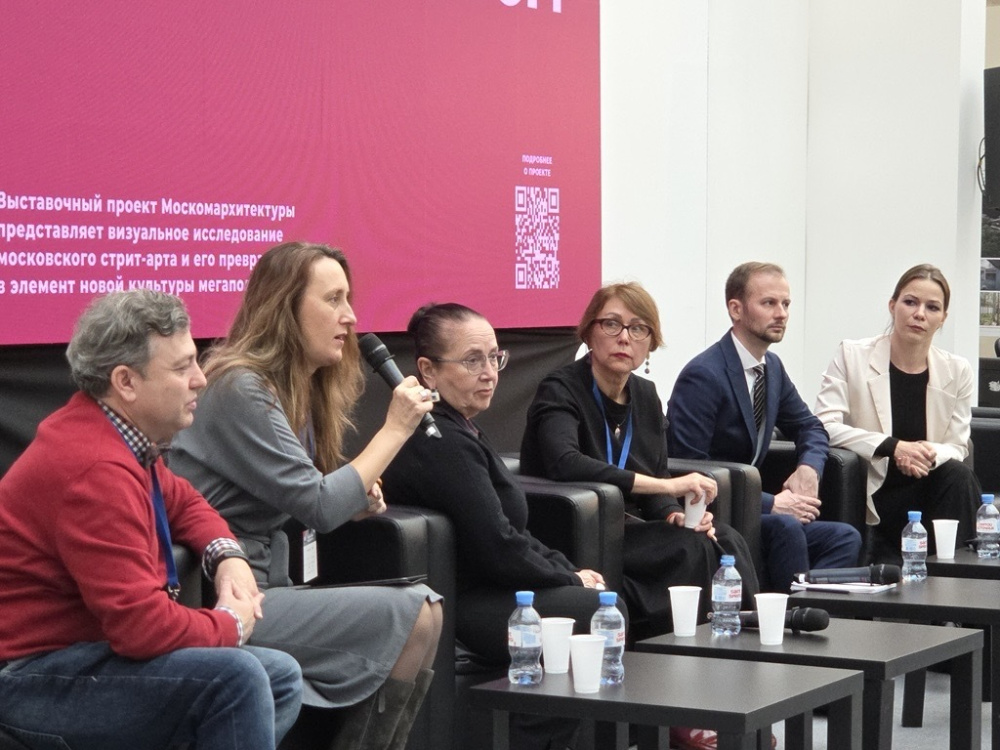 SPbGASU representatives participate in the discussion: Mikhail Vilensky (first from left), Yulia Yankovskaya (second from left), Svetlana Levoshko (fourth from left)
SPbGASU representatives participate in the discussion: Mikhail Vilensky (first from left), Yulia Yankovskaya (second from left), Svetlana Levoshko (fourth from left)
On 6 November, as part of the XXXIII International Architectural Festival "Zodchestvo 2025" in Moscow, SPbGASU initiated a discussion entitled "Architectural science 'on the edge' – a view from the oldest school of architecture". This year's festival's motto, "On the edge," reflected the theme of finding common ground between science and practice in contemporary architecture and urban planning.
The event, organized by our university, brought together scholars, practitioners, and representatives of government and public institutions. The event was moderated by Yulia Yankovskaya, DSc in Architecture, Professor, and Head of the SPbGASU Department of Urban Planning, and Mikhail Vilensky, PhD of Architecture, Associate Professor at the SPbGASU Department of Urban Planning.
The discussion covered a wide range of current topics: from ecology and demography to digitalization and the preservation of architectural heritage.
In his report "Ecology and the city. Demographic processes in urban space", Boris Revich, Doctor of Medical Sciences, Professor, and Head of the Laboratory for Forecasting Environmental Quality and Population Health at the Institute of Economic Forecasting of the Russian Academy of Sciences, emphasized the importance of hygienic comfort and the need to return to an integrated approach to urban design, characteristic of the Soviet architectural school.
Daniil Veretennikov, Director of the "VEB Assets: New Solutions" unit at the State Development Corporation "VEB.RF," in his speech "Master plan: theory and practice" noted the current problems and prospects of master planning, emphasizing the importance of a balance between economic goals and the quality of the urban environment.
Ekaterina Tribelskaya, an academician of the Russian Academy of Arts and Head of the Department of Architecture at the Moscow State Architectural Institute named after V.I. Surikov, presented her experience of "synthesis of the arts" in creating comfortable urban spaces in her report "Architecture – science and (or) art" and expressed concern that artistic aspects are gradually disappearing from architectural practice.
The issue of preserving architectural and urban heritage was raised by Svetlana Levoshko, PhD of Architecture and Associate Professor at the SPbGASU Department of Urban Planning. She noted the contribution of LISI/SPbGASU to the development of scientific approaches to heritage protection and the need for comprehensive solutions in this area.
Oksana Peslyak, PhD of Architecture and Associate Professor at the SPbGASU Department of Urban Planning, spoke about the digital challenges facing the architectural profession. She emphasized that the implementation of digital models should be based on scientific architectural typology and not replace the research process.
In closing the discussion, Yulia Yankovskaya identified the key problems of the current stage in the development of architectural and urban planning science: the lack of continuity and the substitution of long-term scientific guidelines for short-term economic decisions.
In his presentation, "Participatory design in architecture and urban planning: theory and practice," Mikhail Vilensky addressed the issue of resident participation in public discussions of territorial development projects, noting that actual citizen engagement remains extremely low.
The discussion became a significant event in the business program of the "Zodchestvo 2025" festival. Participants concluded that the combination of scientific approach and practical experience will preserve and develop the best traditions of the Russian architectural school.
Particular attention was paid to the SPbGASU initiative to develop architectural science, including through the creation of a new scientific specialty 5.6.6 "History of Science and Technology (Architecture)", aimed at preserving the continuity and study of architectural heritage.